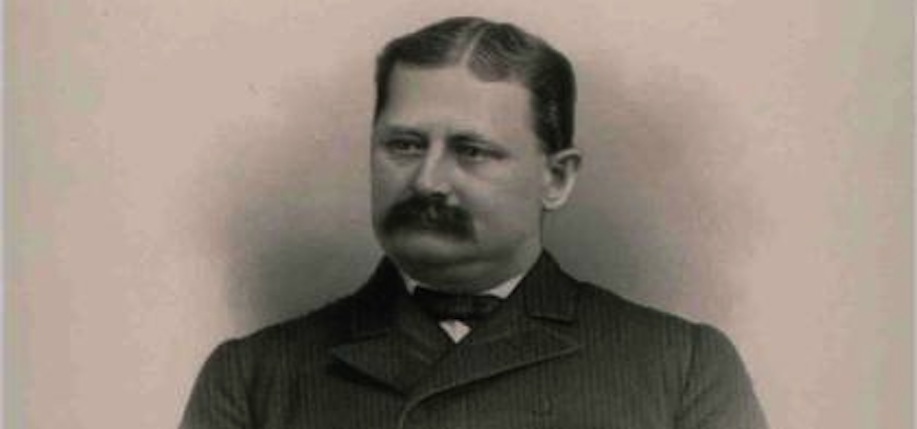All but forgotten today, John J. Kiernan, a pioneer in the financial news industry and inventor of ticker tape news, yields only a handful of hits in a search of the New York
Times archives. But in his day, Kiernan became one of the most influential and wealthy men on Wall Street, giving Charles Dow and Edward Jones, founders of The Wall Street Journal, their start at his news agency.
Kiernan, born February 1, 1845, was the eldest of six children born to Irish immigrants. Though he barely finished grade school, he began his illustrious career at age 12, running errands for the Magnetic Telegraph Company and later becoming a Western Union messenger. Kiernan quickly realized that the hand-written news dispatches he delivered were highly valuable, especially to customers in the financial district who would pay extra for other news from across the wires.
In 1869, using his own savings and borrowing from family and friends, Kiernan launched his own small news bureau, breaking news items in the shipping, railroad and construction fields. He also distributed information to his clients that he received from the New York Stock Exchange and other financial points around the country. Kiernan even went as far as to row out into New York Harbor, skimming ships for days-old newspapers from London and other cities to relay to Kiernan’s Wall Street Financial News Bureau subscribers.
By 1880, Kiernan had hired Charles Dow and Edward Jones, both skilled financial reporters, to work at “Kiernan’s Corner,” the office located at Wall and Broad Streets and the site of today’s New York Stock Exchange. At only 35 years old, Kiernan had amassed a fortune of about $250,000. His invention of the “ticker” expanded the reach of the business, which began to supply general news. As his financial news agency continued to prosper, Kiernan turned his attention to politics, winning two terms as a Democratic state senator beginning in 1881. In 1880, as a delegate to the Democratic National Convention, Kiernan was given the honor of escorting Charles Stewart Parnell through Wall Street and into the Stock Exchange during his visit to America. It was a significant time for Parnell – his party, the Irish Parliamentary Party, had been pushing hard for land reform, believing that abolishing landlordism and allowing tenant farmers to own the land they worked on was a crucial step in securing Irish independence. During his trip to New York and over sixty other cities, Parnell was able to garner support for Home Rule and funds for improvement of living conditions among poor Irish tenant farmers.
Kiernan found success as a politician, authoring bills to improve New York Harbor and expanding ferry service. However, as he focused more on politics he saw the success of his news agency decline. In 1882, Dow and Jones left Kiernan’s agency and launched their own financial sheet, Customer’s Afternoon Letter. The venture was instantly successful, and eventually the newsletter became The Wall Street Journal.
In an attempt to revive his business, Kiernan brought in William P. Sullivan as a partner, but the relationship quickly turned sour. After a series of scornful notes about Kiernan’s financial dealings were circulated by Sullivan throughout their company and published by the local papers, the partners settled in court in 1888. Sullivan bought the company for only a few thousand dollars, leaving Kiernan stripped of the agency that had made him rich.
Over his remaining years, Kiernan struggled to regain political clout. Though he had the support of many leading political figures and was nominated for surveyor of the Port of New York, he was unable to attain a measure of his past success. He was last prominent as a pro-Cleveland Democrat, speaking publicly about the possibility of reform within the Irish community. In an 1884 New York Times article citing the near unanimous support of Grover Cleveland’s presidential nomination, Kiernan is quoted as saying, “I have visited every prominent man in the banking and commercial business down town to-day, and I have not found one who is not ready to sustain Mr. Cleveland…As far as I can see, the people who have promised to Blaine [the Republican opponent] the so-called Irish vote, if there be such an entity, have promised to deliver goods which they cannot even handle. I do hear of a great Irish reform taking place in New York. If that movement takes the shape of ignoring the ballot boxes of an organization [Tammany Hall] that has shamed the Irish name for many a year, then I hope the talk about that reform is as true as I could wish it to be.” Cleveland narrowly won New York by just over a thousand votes.
On November 29, 1893, Kiernan died of pneumonia and heart failure at age 48 in his Brooklyn home. His second wife and children survived him. Kiernan’s service was held in St. Stephen’s church, which was packed to the doors, and his remains were interred in Holy Cross Cemetery, Brooklyn.


Leave a Reply